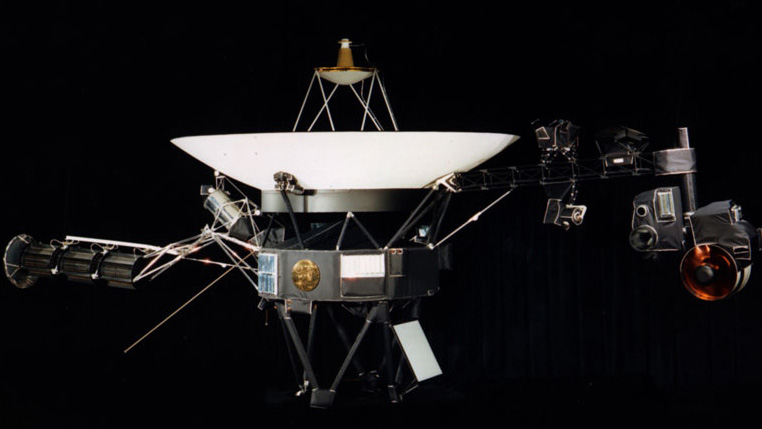NASA's Voyager 1 probe is malfunctioning in deep space due to a critical memory error
A bit was flipped or corrupted in the volatile memory of the Flight Data Subsystem used to control the Voyager 1

NASA's Voyager 1, one half of the Voyager pair of probes that have been the longest-operating spacecraft in history, is currently malfunctioning in deep space without science or engineering data coming back to Earth— including telemetry that's critical to moving and properly aligning the spacecraft.
According to information from NASA and reporting originally from Ars Technica, this happened due to a memory error occurring within the Voyager 1's onboard "Flight Data System (FDS)," which uses an older version of volatile memory that has seemingly corrupted after all these years of operation. Both NASA's Voyager 1 and Voyager 2 were launched in 1977, which means it took about 45 years for Voyager 1's primitive RAM equivalent to fail. That's impressive for primitive tech, but it just may wind up retiring the most aged spacecraft out there.
Even if the current memory error that has rendered Voyager 1 unusable can be fixed, these Voyager probes are both expected to slowly decay in their usability over time. This is because they use nuclear batteries which will lose power year-over-year, requiring instruments on the spacecraft to be disabled in order to keep operating it once the battery has lost enough power.
NASA's Voyager program is a staple piece of human history and outer space research, but it seems apparent that the two Voyager probes themselves won't last forever. This is unfortunate, since the Voyager 1 is currently the farthest human-made object from Earth— essentially the peak of our deep space exploration, in other words.
The Voyager team at NASA is still doing what it can in an attempt to preserve the Voyager 1 probes, but at time of writing it seems fairly uncertain whether or not it can succeed. Without direct access to telemetry, which the memory error ruined, the exact cause of the memory error can't be easily identified from Earth. One solution being considered is sending the Voyager 1 operating commands for when it flew by Jupiter and Saturn over 40 years ago, potentially revealing what aspect of FDS memory is causing the problem.
Get Tom's Hardware's best news and in-depth reviews, straight to your inbox.

Christopher Harper has been a successful freelance tech writer specializing in PC hardware and gaming since 2015, and ghostwrote for various B2B clients in High School before that. Outside of work, Christopher is best known to friends and rivals as an active competitive player in various eSports (particularly fighting games and arena shooters) and a purveyor of music ranging from Jimi Hendrix to Killer Mike to the Sonic Adventure 2 soundtrack.
-
elforeign This is a real shame. I hope they are able to regain control, but from the looks of things the memory error may result terminal. This spacecraft has always captured my imagination and it's been interesting to follow its trajectory into the heliopause and beyond. A marvel that it has lasted this long and gone so far.Reply -
punkncat I read another article about that early this morning. Much like the poster above, I have always been fascinated by the Voyager missions and try to keep up with what is going on with them. It is pretty astounding how much more 'science' they have gleaned from these machines so long past their primary mission. My understanding is that they can tell it is still running/alive, but cannot send commands or even a reboot with the memory fault present.Reply
Speaking for myself, when Star Trek used this satellite as a primary part of the first orignal cast movie, didn't hurt much either. I have rather wondered that if we should live (as a human race) long enough to actually be capable of travelling the vastness of space as quickly as fiction posits, it would be really cool to chase after this/these and recover them. -
PEnns Sad to read such news, but what those probe have achieved is extraordinary.Reply
One could only dream of such hardware reliability and longevity these days! -
stonecarver This is weird I just out of the blue watched an hour long documentary about the two voyager satellites a few days back. For all these years I had forgotten about them as there launch was a life time ago. RIP little guy.Reply -
TJ Hooker Reply
I think this title may make things sound a little more dire than they are. From the source NASA blog post:Admin said:NASA's Voyager 1 satellite is currently lost in deep space due to a critical memory error : Read more
"The spacecraft is receiving and executing commands sent from Earth ' -
peterf28 Those probes were humanity's worst mistake, a fatal error. They basically contain targeting data for target Earth.Reply -
newtechldtech It is strange that they dnt put backup hardware on it , for such a long living hardware at least two or even more backup hardware should be included to take over operation once the original one stops working or gives errors.Reply -
logainofhades Replypeterf28 said:Those probes were humanity's worst mistake, a fatal error. They basically contain targeting data for target Earth.
Nah the aliens already know where we are. :p -
stonecarver Reply
They say that's who built those pyramids thingy's :rofl: And Bill up the street I swore I seen his garage glowing more than a few times at 3am.logainofhades said:Nah the aliens already know where we are. :p
But all kidding aside I thought about the friendly care package of information we sent out to some villain that only could be thought up on the DR Who TV show.
If Rose or Clara show up I'm good:cool:
But if Cybermen or the Master show up.:eek: